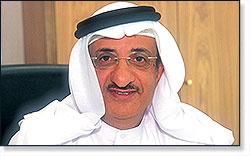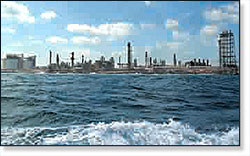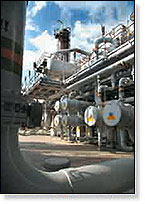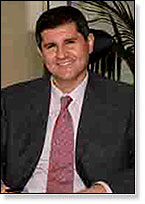|
|
|
|||
|
|
|
|
|
|||||||
 |
 |
 |
 |
 |

Issue No. 33 - April 2006
| COVER STORY - ADGAS Working with Shell to sustain performance improvement |
As a part of the ADNOC (Abu Dhabi National Oil Company) Group of Companies, ADGAS established the first Liquefied Natural Gas (LNG) plant in the Middle East in 1973. The shareholders of ADGAS are ADNOC (70 per cent), Mitsui (15 per cent), BP (10 per cent) and Total (5 per cent). As part of the company's drive to match world-class performance, ADGAS signed an agreement in 2004 to join Shell's Gas and LNG Operational Benchmarking Study Group. Following early results, ADGAS has engaged the services of Shell Global Solutions to carry out studies to assist ADGAS further in the challenge of continuous improvement. 'Shell in the Middle East' talks to Rashid Saif Al Jarwan, General Manager of ADGAS, as his secondment from ADNOC to ADGAS comes to an end...
"This close relationship has been enhanced not just by the excellent personal relationship I have had with Dr Mohamed Defrawi, Managing Director of Shell Abu Dhabi, but is also strengthened by the fact that I am an ADNOC secondee working here in ADGAS. ADNOC is a joint venture partner with Shell in two of the ADNOC Group of Companies, namely ADCO [Abu Dhabi Company for Onshore Oil Operations] and GASCO [Abu Dhabi Gas Industries Limited]. "Shell has quite a few secondees working in ADNOC and its Group of Companies, so we have had plenty of contact with Shell over the years. "A strong link between ADGAS and Shell has been forged because ADGAS is mainly an LNG producer and Shell is one of the world's largest LNG producers and marketers. ADGAS was a pioneer of the LNG business and was the first company in the Middle East to produce LNG, with our first cargo exported to Japan, to TEPCO [Tokyo Electric Power Company], in 1977," he says, adding that TEPCO has, for the last 29 years, been not only the company's biggest customer but more of a partner. The ADGAS plant, which is situated 160 kilometres offshore in Abu Dhabi waters on Das Island, started off with two LNG trains with a production capacity of 1.5 million tonnes per annum (mtpa) each. In 1994 a third train, with a capacity of 3 mtpa, was added to the plant, bringing the total LNG production capacity for ADGAS to 6 mtpa, most of which goes to TEPCO, in addition to 2 mtpa of LPG [Liquefied Petroleum Gas], pentane and sulphur. The excess LNG is sold on the spot market.
"The reason that we chose Shell to be our Technical Consultant was because Shell is well known globally for its strong technical capabilities in the field of LNG. "The operation of the plant at ADGAS is quite complex when compared to the standard LNG plant. We have various mixes and types of gas, such as associated and non-associated gases, high pressure and low pressure gases and many different qualities, including rich and sour gases with fairly high levels of H2S [hydrogen sulphide] and CO2 [carbon dioxide]. "The Das Island LNG plant almost acts as a hub for all the gas produced offshore in Abu Dhabi waters. It has to treat and process all these different types of gas in one plant, and this makes the production process quite cumbersome," he explains.
"Shell's expertise in benchmarking is particularly well known and valuable in the LNG industry," says Rashid. "Shell has a large number of LNG plants around the world in which it is either a shareholder, operator or both. This means that Shell has access to a wide range of data which puts the company in an excellent position to evaluate the performance of not just its own plants but those of other operators. "So Shell, through Shell Global Solutions, provides a benchmarking service that covers all aspects of different LNG plant operations - without giving away sensitive commercial information - and is able to provide its clients with a very good overall perspective of where they stand in the global LNG business in terms of their performance in particular aspects of their LNG operations. "By knowing where we rank against the best-in-class operators in the LNG business, the benchmarking exercise is able to provide us with valuable information concerning the areas in which we are performing well, and not so well. This then allows us to focus on the areas which need improving and to utilise best practices used by other companies." On the subject of raising production at ADGAS, he says, "Whilst we have no plans to build further trains at the moment, this cannot be excluded for the future. We have carried out de-bottlenecking studies on trains 1 and 2 and will be examining some of the results of the findings with a view to introducing changes which could lead to a rise in production. We are also considering a de-bottlenecking study on train 3. "We are assessing whether it would be better, in the long term, to rejuvenate our trains or whether we should replace the existing trains with new ones. If the option is to replace the existing trains, we would have to make a decision as to whether to go for new higher capacity trains to take advantage of the economy of scale. "Naturally, we follow trends in the market place for LNG and if we see an opportunity for ADGAS we will consider going for higher production capacities. We are always interested in new opportunities. However, Abu Dhabi's gas reserves, which are ranked fourth in the world, have a wide range of uses within the ADNOC Group and within the economy of the United Arab Emirates, and ADGAS is not the sole recipient of gas from the Emirate's reserves.
"The decisions concerning the use of gas within the UAE are made by ADNOC and The Supreme Petroleum Council, which has the bigger picture, and are taken for the benefit of the country and its people, taking into account the total mix of availability and demand and looking well into the future. "ADGAS has all the fundamentals and the capability to increase production capacity and grow its business and revenues. We have an excellent skill pool of expertise and experience within the company. We are very proud of our level of Emiratisation, which is currently running at 54 per cent, and is within the ADNOC Group targets, and we are very proud of the calibre of our people. We also have good market knowledge. So it is in the best interests of the company to seek growth but this desire must be balanced along with the interests of the UAE. "For the moment, therefore," he continues, "ADGAS is undergoing a study of the plant which is now nearly 30 years old to ensure that we can maintain our current levels of production and commitments to our clients. "An issue that has already emerged from the benchmarking exercise with Shell, for example, is that of flaring and emissions and we have recently signed an agreement with Shell to carry out a study to reduce flaring and emissions from all our facilities to improve both our environmental performance and to save costs. "As for our HSE [Health, Safety and Environment] standards at the plant, which are based on ADNOC's and Shell's HSE Management System and which we have adapted to suit our own requirements and circumstances, our record of LTIs [Lost Time Injuries] is excellent. We have recently exceeded 20 million man hours worked without a single Lost Time Incident, which is almost four years without a single LTI. So I am very proud of this record as it shows that we have established a strong safety culture within the company. "Finally," Rashid concludes, "the LNG business is like a big club and whilst we do have technical exchanges between the different producers around the world, the sort of comprehensive and detailed scrutiny achieved through Shell's benchmarking study is not available through any other means and is definitely a beneficial exercise for ADGAS and, indeed, for other companies. "So I hope that this benchmarking exercise with Shell will identify other areas where ADGAS and Shell can work together in the future."
"As a world leader in the LNG business, Shell's annual equity LNG production is currently running in excess of 11 million tonnes per annum [mtpa] and is expected to increase to over 25 mtpa over the next 10 years. "In early 2004 an ADGAS team visited Shell offices in The Netherlands to discuss shutdown management and maintenance practices. This was an intensive visit which focused on Shell's LNG plant shutdown management practices in great detail. "Also in 2004, a three-year contract was signed for ADGAS to join the Shell Gas and LNG Operational Benchmarking Study Group. This group is made up of LNG and gas plants around the world which participate in Shell's benchmarking study to compare their own performances in various areas of their operations against other operators. "The first two years of the study have now been completed and improvement opportunities have been identified across different parts of the ADGAS plant operation. "In 2005 an ADGAS team discussed Shell practices in integrity and reliability management and gained an insight into Shell practices and the tools which are available to assist in this area. "Following a review of the benchmarking data for 2004, ADGAS requested Shell Global Solutions' assistance in conducting a workshop on benchmarking gap analysis. The workshop resulted in a structured gap closure action plan with prioritised improvement actions. "A Shell Global Solutions team of LNG operational and maintenance management experts has also carried out a review of ADGAS' shutdown management practices. This review made use of the insight gained by Shell Global Solutions from ADGAS' performance benchmarked against LNG peers. "In 2005 a consultancy agreement was signed with ADGAS for Shell's support in conducting a flare and emissions reduction study. This review is an in-depth analysis of ADGAS' operations with specific recommendations for performance improvement in flaring and emissions reduction. "Following these reviews, ADGAS has indicated that further Shell support may be sought in other areas where improvement opportunities have been identified. "These initiatives between Shell and ADGAS, complemented by ongoing support initiatives from other ADNOC companies, underline Shell's positive contribution to the long-term development of Abu Dhabi and our valued partnership with ADNOC," concludes Ahmad. |
 "Whilst Shell is not a joint venture partner in ADGAS, the relationship that exists between Shell and ADGAS, as an ADNOC Group Company, is a close one," says Rashid Saif Al Jarwan.
"Whilst Shell is not a joint venture partner in ADGAS, the relationship that exists between Shell and ADGAS, as an ADNOC Group Company, is a close one," says Rashid Saif Al Jarwan. Rashid goes on to say, "There are today specific business connections between ADGAS and Shell because we do business with each other in two ways. ADGAS has a Sales and Purchase Agreement with Shell for LNG cargoes. We are also using the services of Shell Global Solutions as a Technical Consultant and Shell Global Solutions is currently doing some very good work for us.
Rashid goes on to say, "There are today specific business connections between ADGAS and Shell because we do business with each other in two ways. ADGAS has a Sales and Purchase Agreement with Shell for LNG cargoes. We are also using the services of Shell Global Solutions as a Technical Consultant and Shell Global Solutions is currently doing some very good work for us. In 2004 ADGAS signed a three-year agreement with Shell to participate in Shell's Gas and LNG Operational Benchmarking Study Group. At the end of the three years the company plans to implement an action plan to carry out some improvements.
In 2004 ADGAS signed a three-year agreement with Shell to participate in Shell's Gas and LNG Operational Benchmarking Study Group. At the end of the three years the company plans to implement an action plan to carry out some improvements. "Gas in the UAE is used in a variety of ways, for LNG production, as a feedstock in the petrochemical industry, as a fuel for power stations and industry and for re-injection into the oil reservoirs to aid and improve oil recovery.
"Gas in the UAE is used in a variety of ways, for LNG production, as a feedstock in the petrochemical industry, as a fuel for power stations and industry and for re-injection into the oil reservoirs to aid and improve oil recovery. "Shell is pleased to be assisting ADGAS in sustaining performance improvement," says Ahmad Atallah, Technical Manager, Shell Abu Dhabi.
"Shell is pleased to be assisting ADGAS in sustaining performance improvement," says Ahmad Atallah, Technical Manager, Shell Abu Dhabi.